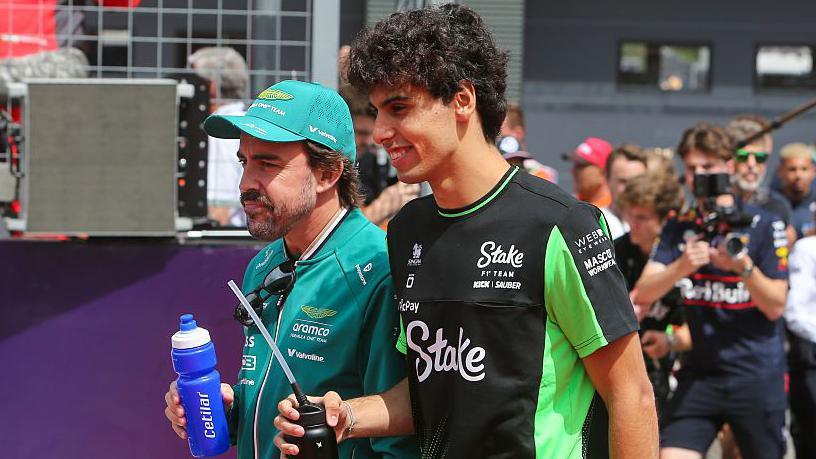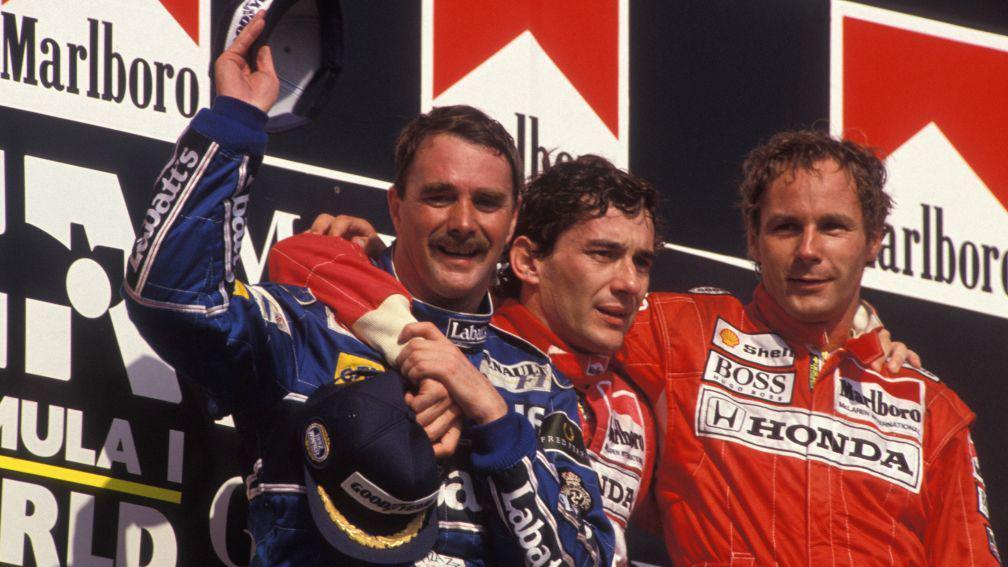Why have Ferrari been unable to win a title since 2008?

- Published
Formula 1 is in its summer break until the Dutch Grand Prix at the end of August.
There will be 10 races remaining once the season resumes and the world title seems to be a straight fight between McLaren team-mates Oscar Piastri and Lando Norris.
BBC Sport F1 correspondent Andrew Benson answers your latest questions.
There are new rumblings about Ferrari's performance. They have performed consistently well (almost always in the top three teams since 2010), but why are they never quite able to head the field? – Martin
This is one of those questions which Formula 1 teams tend to answer along the lines of "if we knew, we'd be doing it already".
The simple answer is that other teams have done a better job over that period and produced faster cars. Of course, the real question is, why is that the case?
When Lewis Hamilton first spoke to the media as a Ferrari driver this year, he said that the team had "absolutely every ingredient to win".
He is far from the first driver to say that about Ferrari when they arrived at the team, impressed by the factory, the resources, how everything is on site in Maranello together, and the passion of all those working for the team.
Of course, Hamilton's tone has changed somewhat since then, and he went into the summer break in a very downbeat manner after a difficult first half-season with the team.
In the modern era, Ferrari has worked at its best when a small, tight-knit circle of expertise at the top insulated the team from interference from outside and focused on togetherness - that would be the era of Michael Schumacher, Jean Todt, Ross Brawn and Rory Byrne.
If anyone questioned the role of one of the others, the rest would rally around and make it clear that if he went, so would they.
Ferrari is a unique team with unique pressures on it. It is effectively the Italian national team, so the public feel as if they have a stake in it in a way that is not the case anywhere else. That always tends to amplify any problems, and makes it easier for any crisis to become a drama.
At the same time, people who have worked at Ferrari and subsequently left tend to talk about the culture there and the problems it creates. They say there is a tendency for people to try to protect themselves, and to do so by blaming other people or areas in the company when problems arise.
But to be at their best F1 teams require collectivism, for everyone to be pulling in the same direction, for absolute trust in each other, without feeling the need to point fingers when things go wrong.
To compete with and beat the best of the best, teams need a culture where people feel free to express themselves and the focus becomes the problem that needs solving, not a person.
If people are more worried about about watching their backs, or get into a "them or me" mindset, the structure becomes too lean and lacks the necessary robustness.
This is the opposite of the "no-blame culture" Mercedes employed through their successful era from 2014-21, and which McLaren have adopted so successfully now.
This is not to say that this is the problem at Ferrari now - I can't possibly know. But it has certainly been, according to those who have witnessed it, in the past.
The last team principal, Mattia Binotto, used to talk about trying to establish this type of culture at Ferrari, but it was never clear that it was working. Many, indeed, felt that then it was twisted into a "no-fault" culture, which is not the same at all. And now Frederic Vasseur is trying to inculcate something similar.
Vasseur has been given a new contract and the trust and faith of the management in the form of chairman John Elkann and chief executive officer Benedetto Vigna. It's now up to Ferrari to make it work.

Gabriel Bortoleto (right) is managed by two-time world champion Fernando Alonso
Is Gabriel Bortoleto likely to be offered a more competitive drive? - Steven
Bortoleto scored the best result of his young career so far with sixth place at the Hungarian Grand Prix for Sauber.
This continues an impressive rookie season, in which the 20-year-old Brazilian has so far pretty much matched his experienced team-mate Nico Hulkenberg for pace in qualifying and has begun to look increasingly effective in races.
When Sauber announced Bortoleto would be driving for them this year, they said that he would race in 2025, and that he was on a multi-year contract.
This sounds like a typical arrangement with a rookie driver - the team locks them down from their side with a contract that guarantees one year of racing, with options on the team's side to continue if they perform as expected, and to release them if they don't.
Owner Audi, who will enter F1 officially in 2026, will not comment on driver contracts, but they say that their team of drivers "works so well together" and that "another driver line-up is not expected".
On top of that, with regard to the question, it's hard to know which drives will be "more competitive" next year, because there will be new chassis and engine rules in F1 in 2026 and they are expected to reset the field, at least to some extent.
With Audi set to enter the sport, there'll be two powerhouse German manufacturers on the grid from 2026. Is there any hope that this could bring back a German Grand Prix? - Grant
With both Mercedes and Audi in Formula 1 from 2026, it would certainly make sense on one level for a German Grand Prix to return, but there is no talk of it at the moment.
F1 president Stefano Domenicali already considers the current 24-race calendar to be the upper limit.
European races are the ones under pressure as the sport continues to look to expand - a new race in Thailand seems to be well on the way, for example, and F1 would like a race on the African continent somewhere.
The Belgian Grand Prix has already signed a new deal that will see it rotate on and off the calendar, missing out in 2028 and 2030 when it is replaced by another race.
This could happen with other races in Europe, too.
Germany's problem, as it is with other European events, is that it is difficult to find the race fee without money from local or central government, and it is not easy for authorities to justify that sort of money on a grand prix in a western liberal democracy.
Canada and Australia are among the exceptions where government funding is critical, but that is justified on the basis of tourism. This has proved to be a less easy argument to justify in Germany.
Hockenheim fell off the calendar in 2018 because it was not financially viable, and it only returned in 2019 because of assistance from Mercedes.
That's not to say that sort of thing could not happen again, but there is no talk of it at the moment.
The manufacturers are in F1 for global marketing reasons, not national ones. Mercedes and Audi would have to consider the cost worthwhile to even start talking about it.
With such a dramatic change in F1 car specifications for 2026, shouldn't we ignore historical circuit lap times and, in particular, lap records as old times are for older cars? - Chris
Just to take one example, changing aspects of a track such as the kerbs or resurfacing it automatically alters the potential fastest lap time a car can achieve.
It's because of issues such as this that any comparison of lap times between years and eras should be taken with a pinch of salt.
But it doesn't seem like something to get particularly worked up about or take that seriously.
This is the thing with statistics, isn't it? They have their place, but they are not the be all and end all. Just look at the all-time driver statistics, for example.
Is Lewis Hamilton more than three times better a driver than Fernando Alonso, or Michael Schumacher more than twice as good as Ayrton Senna? Of course not.

Nigel Mansell won nine of 16 races in 1992, securing the world title at the Hungarian Grand Prix
Who do you think is the best single-time world champion? - Kevin
Any answer to this question is always going to be subjective, and my opinion is of no more value necessarily than anyone else's.
The question taps into an issue with statistics in general which I've also touched on above. They're not everything. For example, Nelson Piquet won three world titles and Nigel Mansell only one. That does not seem a fair comparison of their abilities, especially given how they compared as team-mates at Williams.
There have been surprisingly few one-time world champions in F1's 75-year history.
The 17 are Giuseppe Farina, Mike Hawthorn, Phil Hill, John Surtees, Denny Hulme, Jochen Rindt, James Hunt, Mario Andretti, Jody Scheckter, Alan Jones, Keke Rosberg, Nigel Mansell, Damon Hill, Jacques Villeneuve, Kimi Raikkonen, Jenson Button and Nico Rosberg.
Of that list, you'd probably say Rindt and Mansell were the stand-out names in terms of how they were regarded at the time, and in many all-time lists.
At the same time, Andretti was an incredible all-rounder, Surtees stands out for his titles on two wheels and four, and all the others have many merits and probably have their supporters.
Ultimately, it's an impossible question to answer. And there's another one that goes along with it - what about who is the best non-world champion? Stirling Moss and Gilles Villeneuve are the main contenders for that so far.
Get in touch
Send us your question for F1 correspondent Andrew Benson